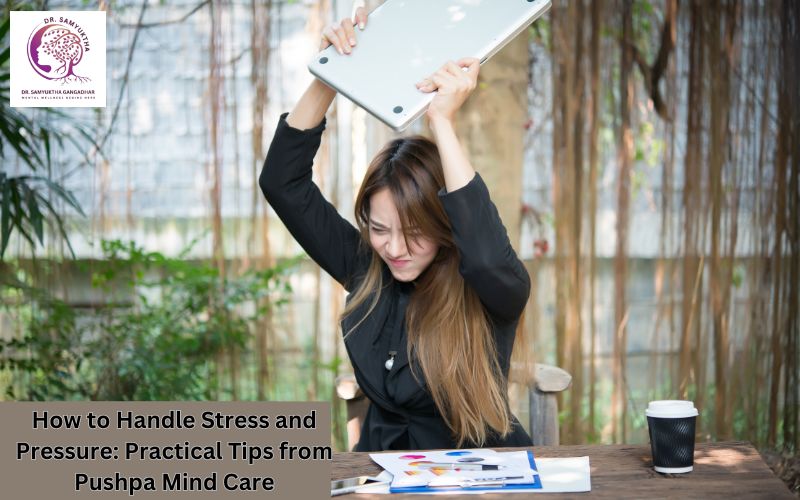Stress and pressure are inevitable parts of life, but how you manage them can make all the difference to your mental and physical health. Whether you’re dealing with work challenges, personal issues, or general life demands, knowing how to handle stress and pressure effectively is crucial. In this blog, we will explore the science behind stress, the psychological and physical effects of pressure, and offer practical, evidence-based strategies to help you cope and thrive while managing how to handle stress and pressure in your daily life.
At Pushpa Mind Care, led by Dr. Samyuktha Gangadhar M.D. (Psychiatry), we believe that mental health is just as important as physical health, and managing stress effectively is the first step toward maintaining overall well-being.
Understanding Stress and Pressure
Before diving into how to handle stress, it’s essential to understand what it is and why it affects us.
What Is Stress?
Stress is the body’s instinctive reaction to any type of demand or challenge. It’s triggered when we encounter situations that we perceive as threatening or overwhelming. Stress can be acute (short-term) or chronic (long-term), and both types have distinct impacts on your body and mind.
Stress activates the body’s natural ‘fight or flight’ response, which results in the release of stress hormones such as cortisol and adrenaline. While this is helpful in life-threatening situations, prolonged stress can lead to health problems such as high blood pressure, weakened immune function, and mental health issues like anxiety and depression.
The Difference Between Stress and Pressure
While “stress” and “pressure” are often used interchangeably, they have distinct meanings:
- Stress refers to the emotional and physical strain experienced due to external or internal challenges. It can arise from work, relationships, health concerns, or life changes.
- Pressure refers to the expectations or demands placed on an individual, often in a high-performance setting. This can lead to stress, but pressure is more about the external expectations rather than internal emotional responses.
The Lasting Impact of Stress on Your Health
Prolonged exposure to stress can have severe consequences. Both physical and mental health can be affected, leading to the development of various disorders:
- Physical Health: Chronic stress can contribute to cardiovascular disease, digestive issues, obesity, headaches, and sleep problems.
- Mental Health: Anxiety, depression, burnout, and mood swings are common results of untreated stress.
- Cognitive Function: Stress can impair memory, concentration, and decision-making abilities.
According to a study published in The Lancet Psychiatry (2019), long-term stress can lead to significant mental health challenges, affecting both the quality of life and productivity.
Practical Strategies to Handle Stress and Pressure
Now that we understand the nature of stress and pressure, let’s explore effective strategies on how to handle stress and pressure in a way that promotes both mental and physical well-being.
1. Practice Mindfulness and Meditation

Mindfulness involves focusing on the present moment, paying attention to your thoughts and emotions without reacting or forming judgments. This simple practice can reduce stress by helping you detach from negative emotions and anxiety.
- Scientific Backing: A 2018 study in Psychosomatic Medicine found that mindfulness-based stress reduction (MBSR) helped reduce symptoms of anxiety and depression in participants.
2. Exercise Regularly
Regular exercise is one of the most powerful ways to alleviate stress and improve overall well-being. Exercise helps reduce the levels of cortisol (the stress hormone) and increases the production of endorphins, which are chemicals in the brain that improve mood.
- Tip: Aim for at least 30 minutes of moderate exercise, such as walking, cycling, or yoga, most days of the week.
- Scientific Backing: According to the American Journal of Preventive Medicine, regular physical activity can significantly lower levels of stress and improve mental well-being.
3. Get Enough Sleep
Lack of sleep can exacerbate stress, leading to a cycle of fatigue and heightened emotional reactions. Good sleep hygiene is essential for handling stress and maintaining optimal health.
- Tip: Establish a regular sleep routine, avoid screens before bedtime, and create a relaxing environment to improve your sleep quality.
- Scientific Backing: A study published in Sleep Health (2020) highlights that sleep disturbances are linked to higher levels of stress and anxiety.
4. Time Management and Prioritization
One of the primary contributors to stress is the sense of being swamped by numerous responsibilities. Effective time management helps reduce pressure by allowing you to prioritize and focus on what matters most.
- Tip: Break down tasks into smaller, manageable steps, and use tools like calendars or task lists to stay organized.
- Scientific Backing: Research in The Journal of Applied Psychology (2021) demonstrates that time management skills are significantly linked to reduced stress levels in high-pressure environments.
5. Connect with Others
Social support is a powerful buffer against stress. Talking to friends, family, or a therapist about your challenges can provide emotional relief and perspective.
- Tip: Make time for regular social interactions, whether in person or virtually, to nurture your support system.
- Scientific Backing: Studies in Health Psychology (2016) show that individuals with strong social networks experience lower levels of stress and improved emotional health.
6. Develop Healthy Coping Mechanisms
Instead of turning to unhealthy coping strategies like smoking, drinking, or overeating, adopt healthy methods that help you deal with stress in a constructive way.
- Examples: Journaling, deep breathing exercises, listening to music, or spending time in nature can help reduce stress levels.
- Scientific Backing: According to The American Journal of Psychiatry, healthy coping strategies improve emotional regulation and reduce stress-induced mental health problems.
7. Seek Professional Help

If you find that stress and pressure are becoming overwhelming, seeking help from a mental health professional is a crucial step. Dr. Samyuktha Gangadhar, a qualified psychiatrist at At Pushpa Mind Care, can help diagnose and treat underlying conditions like anxiety, depression, and stress-related disorders. Our expert team offers tailored solutions on how to handle stress and pressure, using therapy, counseling, and medications to manage these conditions effectively..
- Tip: If you’re experiencing severe stress or signs of burnout, reach out to a mental health professional for guidance and treatment.
When to Seek Help from a Psychiatrist
Stress can be manageable, but when it becomes chronic or overwhelming, it may be a sign of a deeper issue. If you experience symptoms like persistent sadness, irritability, panic attacks, or difficulty functioning, it may be time to consult with a professional, such as Dr. Samyuktha Gangadhar at Pushpa Mind Care, to learn how to handle stress and pressure effectively.
- Signs You Need Help:
- Persistent feelings of anxiety or panic
- Physical symptoms like headaches, muscle tension, and digestive issues
- Difficulty sleeping or concentrating
- Withdrawal from social or professional life
Conclusion
Learning how to handle stress and pressure is crucial to maintaining your mental and physical health. Through practical strategies like mindfulness, exercise, prioritizing sleep, and seeking professional support when necessary, you can regain control and lead a healthier, more balanced life.
At Pushpa Mind Care, we’re committed to supporting you in your mental health journey. Whether you’re looking for coping strategies or need professional help, Dr. Samyuktha Gangadhar is here to guide you.
FAQs
Handling stress involves mindfulness, regular exercise, effective time management, and seeking support. Pushpa Mind Care, led by Dr. Samyuktha Gangadhar, offers personalized strategies to manage stress and pressure. If you need professional guidance, we are here to help you regain control.
To handle stress in an interview, prepare thoroughly, stay calm, and focus on the present moment. If stress impacts your performance, Pushpa Mind Care offers expert support to help you manage anxiety and perform your best in high-pressure situations.
To control stress, identify triggers, practice healthy coping mechanisms like exercise and relaxation, and get enough sleep. If stress becomes overwhelming, Pushpa Mind Care can help. Dr. Samyuktha Gangadhar provides tailored strategies to effectively manage stress and improve your well-being.

